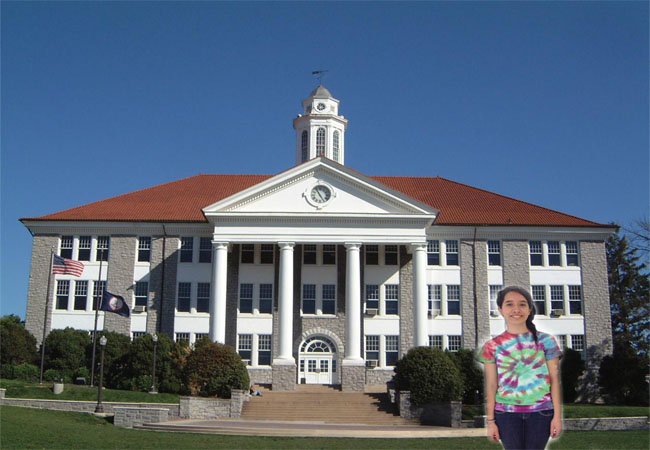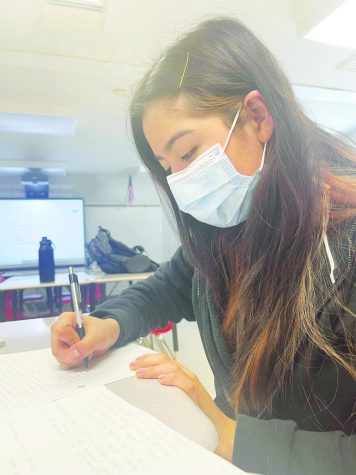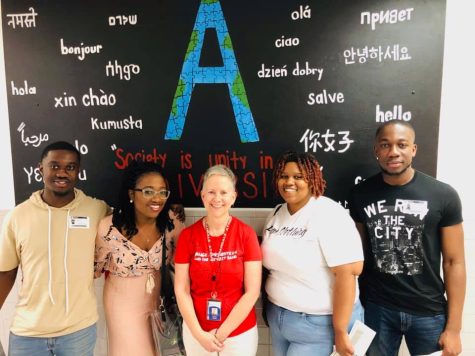In-state tuition extended to DREAM Act students
Photo illustration by Omnia Saed
Alderete is pictured above in front of James Madison University. JMU is one of the state schools that will be affected by the state action.
Applause erupted at the end of Virginia Attorney General Mark Herring’s speech outside of Northern Virginia Community College’s Alexandria campus on Tuesday, April 29.
“I found out through my mom, one of her colleagues at our church’s immigration center told my mom who later told me,” junior Paula Alderete said. “I was honestly a little bit shocked, because I wasn’t expecting it.”
Herring was announcing that students who are residents of Virginia under the DREAM Act can now receive in-state tuition at Virginia state schools.
The DREAM Act, or the Development, Relief and Education for Alien Minors Act, is a federal law that, according to the National Immigration Law Center, “permits certain immigrant students who have grown up in the U.S. to apply for temporary legal status and to eventually obtain permanent legal status and become eligible for U.S. citizenship if they go to college or serve in the U.S. military”.
The DREAM act has benefited many people in the Northern Virginia area, including students here at AHS.
“When the DREAM Act passed last year, I remember the day, it was in June, right after school ended, I was obviously really happy,” Alderete said. “Two months later, in August, my mom and I started the process of filing for Deferred Action for Childhood Arrivals, or DACA.”
Students here under the DREAM Act are typically immigrants into the U.S. and therefore cannot receive in-state tuition at state universities.
“I came to the U.S. when I was four years old, so I’ve been here most of my life,” Alderete said. “I had to come from Argentina because in Bolivia, they wouldn’t let me out of the country. I was able to get a passport because of my mom’s Argentine nationality.”
Herring’s decision instantly made college more affordable for the more than 8,000 illegal youths in Virginia, the about 7,000 in Maryland. Nationwide, there are more than half a million students that have won approval based on their age, length of residency and full-time enrollment in school.
“Ever since kindergarten, my mom has been gathering money for me to go to college. We knew that it was going to cost more since we’re immigrants,” Alderete said. “This has really opened so many opportunities for me, being able to come and study closeby and at a very affordable price.”
As of the year 2012, AHS had a student body of 2534 people. In that same year, the percentage of students with Free or Reduced Price lunch was 46.4 percent. The total minority enrollment in the school was 77 percent. These statistics are just some of the information that shows the diversity of AHS and Northern Virginia in general.
This extreme diversity is just one of the reasons that the recent action taken by Herring will positively affect AHS and the Northern Virginia area.
Herring believes that students that have been here for most of their lives should be able to pay the same amount as someone born here.
“I have concluded that in-state tuition rates can and should be extended to students who qualify,” Herring said. “They have known no home but Virginia.”
Many people see the benefit to this action and to letting immigrants have better access to postsecondary education.
“It will give students a little more hope,” Principal Vincent Randazzo said. “It means that after higher education they can go on trying to fulfil those dreams that they had while they were going through school, you know, being a lawyer, a doctor or an astronaut.”
“We should welcome these smart, talented, hard-working young people into our economy and society rather than putting a stop sign at the end of 12th grade,” Herring said.
However, there is also a conflicting viewpoint associated with this.
“It’s going to give them an opportunity to perhaps afford post-secondary education because of being warranted in-state tuition,” Career Center Specialist Robin Roth said. “But for a lot of them, it’s going to be difficult because, as my understanding goes, they have in-state tuition, but they still cannot get federal aid for schooling.”
Aside from having an effect on the students, this action will also have a profound effect on the state schools that it applies to.
At the University of Virginia, undergraduate tuition and fees in the coming school year for Virginia residents will total $12,998. For those from out of state, the charge will be $42,184.
In Virginia as a whole, there are about 137,000 Virginians who are undergraduates at public four-year universities. That’s about 80 percent of total enrollment.
With this new state action, more Virginia residents can afford to go to state schools, thus increasing the percentage of the total enrollment that is Virginians will go up.
Others disagree with Herring’s views on this.
“I don’t think it’s going to change the ‘look’ of the school,” Roth said. “I don’t think it’s going to allow these students to go to and be residents of that community because it’s still going to be out of reach.”
The fact that the action was announced in Spanish, Hindi, Vietnamese and Korean in addition to English, shows that Northern Virginia is such a diverse area with a multitude of ethnicities represented. This is all the more reason for these different groups of people to be able to afford to get higher education.
Across the country, 19 states, including Maryland, have enacted some form of in-state tuition for qualified young illegal immigrants, spanning a variety of regions and political leanings. The others are: Texas, California, Utah, New York, Washington, Illinois, Kansas, New Mexico, Nebraska, Wisconsin, Connecticut, Colorado, Minnesota, New Jersey, Oregon, Hawaii, Michigan and Rhode Island.
“I really hope that this continues on and spreads across the country, because there are a lot of young immigrants here who could be of so much benefit to the country,” Alderete said.

Jarod is a senior at Annandale High School and has been with The A-Blast for four years. Aside from being the Co-Editor in Chief, Jarod also participates...








